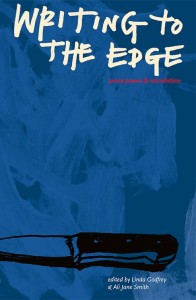1. What inspired you to write the prose poem/microfiction which will appear in Writing To The Edge?
Her dark ground began as a very short piece in a format I often use to develop ideas. It worked well enough to warrant expansion, even though its scale is still very modest. I love how there is really nowhere to hide in a piece this short—how every word, phrase and sentence has to be chosen carefully but nowhere must the effort of that process be apparent. The piece harks back to early days at art school and provides a vehicle for the consideration of how different our internal and external personas can be.
2. Tell us about your process. (Do you start sparse and widen out, or do you write down every possible association and cut back? Do you research the subject matter you are writing about? Is it pure intuition?) Take us through an example if you want.
These short pieces are often intuitive to an extent but come from a desire, when I sit in front of a blank page or a wordless screen, to write something. I really don’t care where inspiration comes from. I’ll cast about the room I’m in, the memories I carry and the words I’ve read or written for the seeds of ideas.
3. What advice do you have for other writers? (About the first or last line? About how to choose the title? Do you follow any rules?)
For writers of fiction, every half-decent idea you have deserves to be written because in writing it will change and become its own entity. So love your of ugly ducklings and see what they might become.
4. Who or what inspires your writing?
I’m inspired by the many very good writers who write continuously, regardless of normal notions of success eluding them. I’m inspired, more generally, by the capacity of people to overcome adversity.
5. Tell us what you do if you haven’t written anything in a while and you want to get started writing again? Could you share your favourite writing exercise with our readers?
The format I mentioned in my first response is a good one. I developed it as an experimental tool for those moments when inspiration is hard to come by. It’s simply a piece constructed of six six-word lines. I imagine it something like the closing sextet of a sonnet. I find working within simple structural constraints such as this often unlocks thoughts. It could be haiku or limerick or writing something with a particular shape—whatever works for the individual writer—but a little imposed structure can (somewhat counter-intuitively) be a real mental lubricant.

